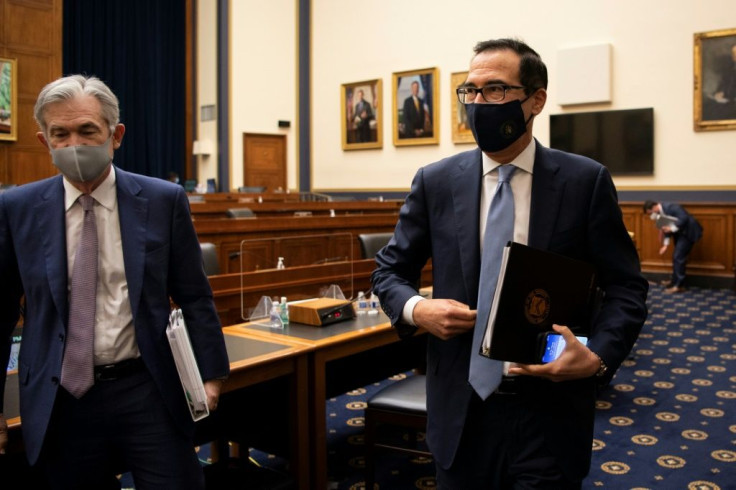Fed's Powell Stresses Economic Uncertainty, Mnuchin Hails Recovery
Treasury Secretary Steven Mnuchin and Federal Reserve Chair Jerome Powell offered mirror images of the state of the US economy as it navigates the Covid-19 downturn in testimony released Monday ahead of appearances before Congress.
Mnuchin, serving his final weeks on the job before President-elect Joe Biden's administration takes office in January, hailed the country's recovery thus far, but Powell warned of continued uncertainty.
Both noted progress on job gains, and Powell pointed to hopeful news about new vaccines that could be coming soon, but added a note of caution.
"The rise in new COVID-19 cases, both here and abroad, is concerning and could prove challenging for the next few months," Powell said in his testimony prepared for delivery to the Senate Banking Committee on Tuesday.
Powell, who is generally upbeat about the gains so far, also repeated his warning that "A full economic recovery is unlikely until people are confident that it is safe to reengage in a broad range of activities."
Mnuchin touted the achievements of the $2.2 trillion CARES Act in helping to boost hiring and lower the unemployment rate to 6.9 percent.
But with just half of the more than 20 million job losses caused by the pandemic recovered, he acknowledged that "our job will not be complete until we get every American back to work."

The Treasury secretary noted that "Additional economic shutdowns, however, continue to impair this remarkable progress and cause great harm to American businesses and workers," and called on Congress to approve "a targeted fiscal package."
The statements for the first of two days of joint testimony gave few signs that the officials could be at odds over the fate of several of the Fed's lending programs, which Mnuchin refused to continue beyond the end of the year.
The Fed earlier Monday announced it was extending four pandemic emergency lending programs for three months through March 31, with approval from the Treasury.
The extended programs dealt mostly with corporate debt. However, Mnuchin would not allow extension of the Municipal Lending Facility or Main Street Lending Program that helps small- and medium-sized businesses that have been hard hit by the pandemic due to shutdowns, restrictions and changes in consumer behavior.
The Fed protested the decision in a rare public statement, saying it "would prefer that the full suite of emergency facilities" remain in place "to serve their important role as a backstop for our still-strained and vulnerable economy."
Mnuchin's decision to pull back $455 billion in unused funds from the Fed, even as the world's largest economy faces the world's worst Covid-19 outbreak, drew intense criticism as well as accusations he was trying to sabotage President-elect Joe Biden's efforts to support the economy.
© Copyright AFP {{Year}}. All rights reserved.





















